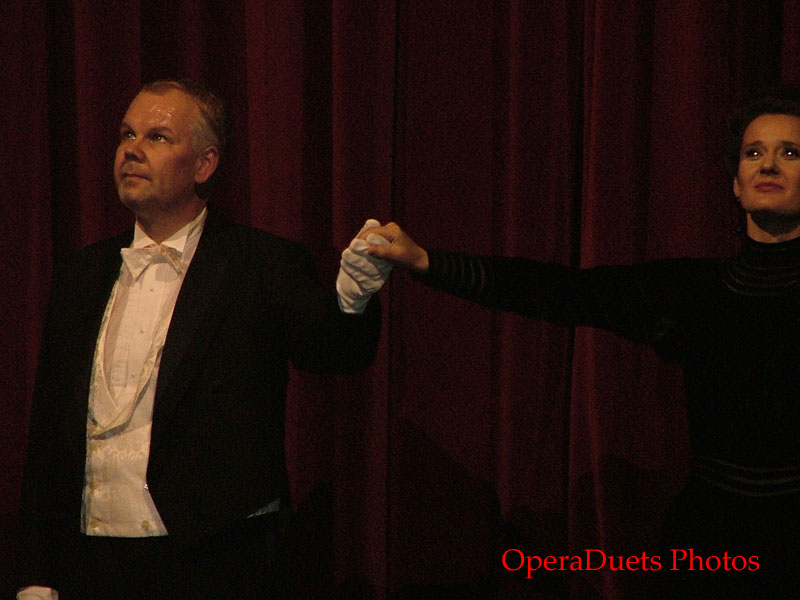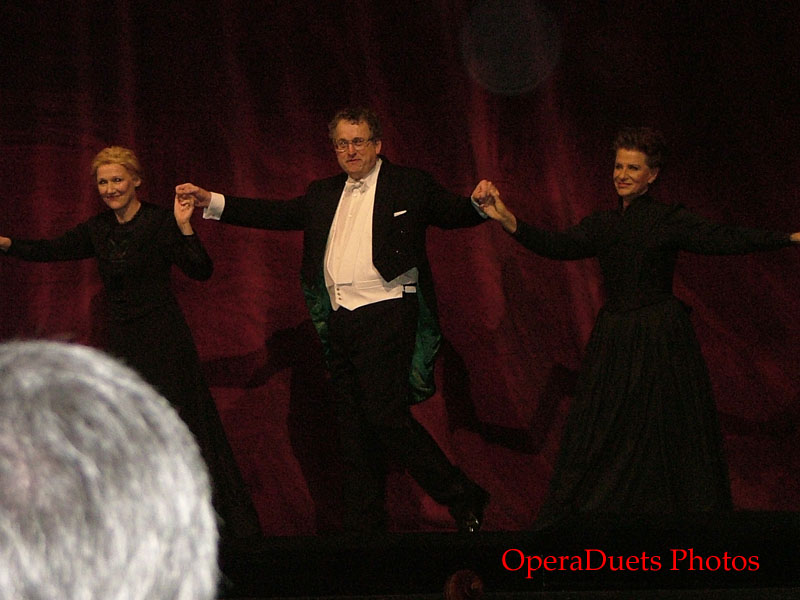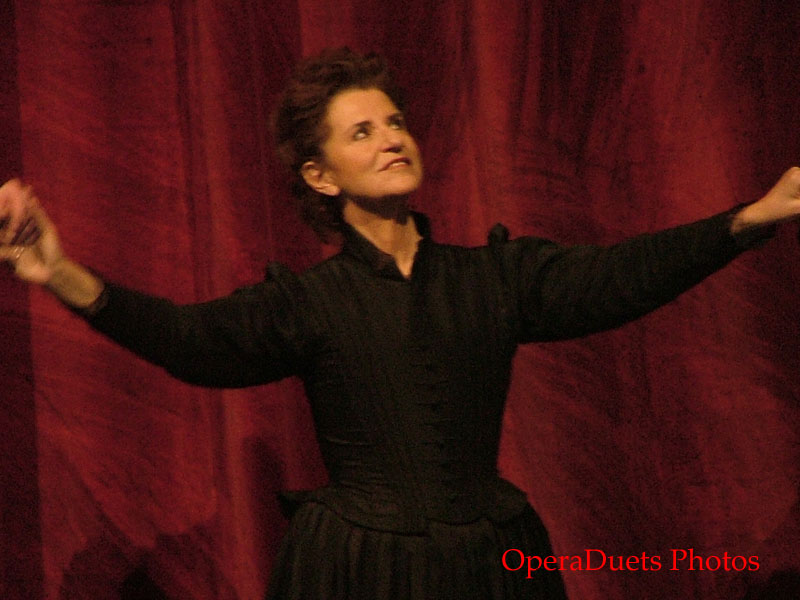2002-03-02 Jenufa (L. Jánácek), Wiener Staatsoper
Die alte Buryja = Anny Schlemm
Laca Kiemen = Jorma Silvasti
Stewa Buryja = Torsten Kerl
Die Küsterin Buryja = Agnes Baltsa
Jenufa = Angela Denoke
Altgesell = Wolfgang Bankl
Dorfrichter = Walter Pink
Seine Frau = Helene Ranada
Karolka = Renate Pitscheider
Schäferin = Stella Grigorian
Barena = Cornelia Salje
Jana = Ileana Tonca
Tante = Waltraud Winsauer
Seiji Ozawa, conductor
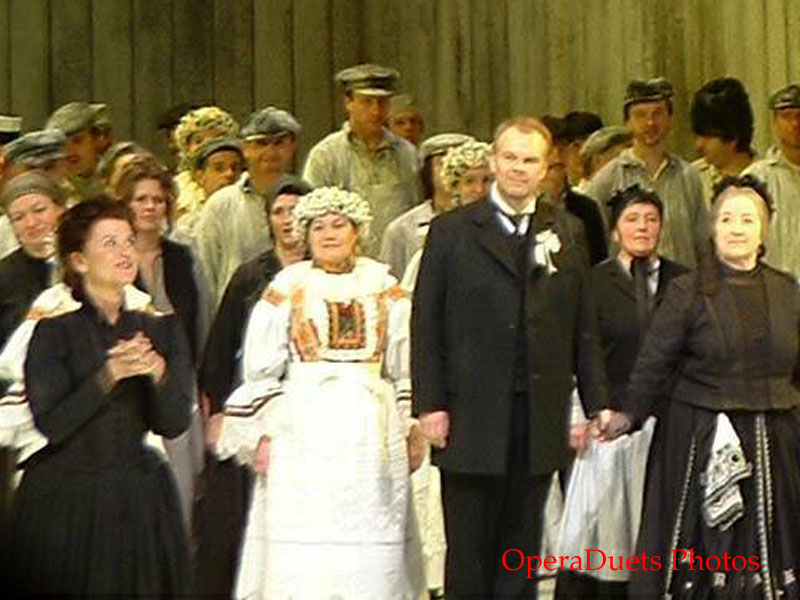
And March arrived, at last it was my turn to experience JENUFA. The good reviews made me look even more impatiently towards this day, 2002-03-02. I had read some different synopsis of this opera, and that was what I knew. After a night on the bus, from Kaupanger to Oslo, and then fly to Vienna via Copenhagen. I had some difficulty in finding my hotel, Hotel am Schubertring, but luckily I had my Vienna map with me. It was spring in Vienna, and I was coming from winter in Norway. My feet got hot, but I had with me shoes for the opera night, so I switched shoes in Stadtpark. I had to wait a bit for my hotel room, but when I got my room, it looked more expensive than I had thought. Luckily the price was right.
As always in Vienna, I visited Arcadia Opera Shop and EMI Austria in Kärtnerstrasse. Wonderful photos (Arcadia) of Agnes Baltsa at the Opernball 2002 and in JENUFA. I bought them naturally. Then I bought Manon Lescaut, Samson et Dalila and Traviata with José Cura (EMI Austria) just to be able to critize them in my Jose Cura website.
After some headache pills, a little Coca-cola, a bath, and a change. OPERA-TIME:
An enthusiastic audience applauded the conductor Seiji Osawa just more and more as the evening commenced. From first note it was beautiful music. Another role that Agnes Baltsa could fill in an eminent way. She was fantastic. WUNDERBAR. Angela Denoke who sang JENUFA had a beautiful and full soprano voice. (Her voice was like Sachertorte). She was very free in her movement, she was moving very well onstage. And she danced like was she a dancer, and not opera singer. KERL and SILVASTRI was great as Stewa and Laca. Anny Schlemm as the grandmother was also very good. A really good production. The singing was in German, probably the best solution since no Czech singers was singing.
The stars of the evening was, without doubt, Seiji Osawa & Agnes Baltsa.
A strong cast, a wonderful chorus and orchestra. The scenography, the director and conductor , and naturally the costumes, all to make it a wonderful production.
Without Agnes Baltsa as Kostelnicka, no JENUFA!
OD Travel + Photos
Friday, March 2, 2018
March 2, 2002: Jenufa in Vienna
Posted by
operaduets
at
Friday, March 02, 2018
0
comments
![]()
Labels: 03_March, 03-02, 2002, Agnes Baltsa, Angela Denoke, Austria, JENUFA, Jorma Silvasti, LEOS JANACEK, Opera, Vienna
Monday, November 6, 2017
November 6, 2005: Osud in Vienna
2005-11-06 Osud (Janacek), Wiener Staatsoper
Zivný = Jorma Silvasti
Míla Válková = Cornelia Salje
Mílas Mutter = Anja Silja
Poet/Dr. Suda/Ingenieur = John Dickie
Lhotský/Verva = Adrian Eröd
Konecný = Georg Tichy
Fräulein Stuhlá = Ǻsa Elmgren
Frau Major = Regina Knauer
Ein Student = Robert Maszl
Eine alte Slowakin =
Waltraud Winsauer
Frau Rat = Janina Baechle
Eine junge Witwe = Eliza Zurmann
Erster junger Mann = Jeong-Ho Kim
Zweiter junger Mann = Ion Tibrea
Doubek als Student = Terry Wey
1. Dame/Pacovská/
Fanca/Soucková =
Ileana Tonca
2. Dame/Kosinská = Simina Ivan
1. Gast = Dritan Luca
2. Gast = Michael Wilder
Ein Ober = Wolfram Derntl
Hrazda = Cosmin Ifrim
Zán = David Prochazka
Nána = Michaela Marhold
Pianistin = Raluca Stirbat
Simone Young, conductor
6. November 2005
OSUD
(6. Aufführung in dieser Inszenierung)
Dirigentin: Simone Young
Inszenierung: David Pountney
Bühne: Stefanos Lazaridis
Kostüme: Johan Engels
Licht: Rudolf Fischer
Regieassistenz: Nicola Raab
Chorleitung: Ernst Dunshirn
AN OPERA about a composer writing a opera. A sort of opera in a opera. Or is this ... Without Jorma Silvasti as the composer this opera would no doubt fail.
Pountney has some point in his regie, it took some time grabbing it, but then I understood the opera better.
Thanks to Agnes Baltsa I have heard Jánácek music before in the opera Jenufa (Wiener Staatsoper 2002). That naturally meant that I had an easier time dealing with the music than I would have had without. But where Jenufa is a more straight forward kind of opera, it is more linear story and you get to know the persons more in a straight way. Osud, Destiny, is a peculiar opera, more operatic than most operas, starts with a chorus containing more of just feelings of sunniness than of sun.
Anja Silja as the mother of Mila. Die Silja is of course famous for her many roles, and is especially known for her Jánácek roles. So here was an expectation that she would as important as Emily Marty in the Macropolous Case or as the Küsterin in Jenufa, two roles that are really her own. But there is not such a big role for her. Of course Anja Silja did it well but I couldn't help to think that Agnes Baltsa would in this role spring much more excitement and be more of a "can't take one's eye of her". Some magnetism was lost. But this was not Anja Silja's opera.
The role of Mila was much more as long as it lasted. And Cornelia Salje was great in this opera. From the moment she appeared it was her show. All other singers faded except Jorma Silvasti as her lover Dr Zisny. Cornelia Salje sang and acted her role as no other could have created this dysfunctional woman, was it the experience with Zisny that have made her such or was it her mother's fault , or...
OSUD is an opera that stands or fails with the tenor singing Dr Zisny. Jorma Silvasti was certainly the chief motor in holding it all together. Where as the role of Laca Klemen in Jenufa never allowed him to show the full extent of his voice and acting ability. The longer one get into the opera one realizes that it is not being realistic is Dr Zisny's opera in the making that we see. Everything is maybe in the composers head. The opera is about the torment of a composer making an opera out of his own experiences. David Poutney makes it possible to see this opera for what is probably is, the working process of an opera seen from the composers view.
One important person in the opera is Doubek, the son of Mila & Zisny. He is in many ways the reason why it all happened. Zisny wants his small son and finds his old love of Mila being as it was new. They live together unhappily with Mila's mother who is demented. When an unfortunate accident kills both Mila and her mother, Zisny is finally able to write an new act. Then Doubek grows up. Zisny decides that the opera is going to be on a stage finished except that 3rd act is missing. When he tells the students about the opera/his life is is almost finished up thinking to hear Mila's voice and a sort of forgiveness/cleaning up the mess happens, and when Doubek helps his father up, Zisny take a bow to the audience, and is like that before our eyes we have seen the 3rd act take shape. It is an opera inside this opera.
OD Travel + Photos
For more reviews from my travels, see www.operaduetstravel.com
If you want to see more photos from my OperaDuets Travels, go to www.operaduetsphotos.com
Posted by
operaduets
at
Monday, November 06, 2017
0
comments
![]()
Labels: 11_November, 11-06, 2005, Adrian Eröd, Anja Silja, Austria, Cornelia Salje, John Dickie, Jorma Silvasti, LEOS JANACEK, Opera, OSUD, Vienna
Friday, June 9, 2017
June 9, 2002: Jenufa in Vienna
2002-06-09 Jenufa (L. Jánácek), Wiener Staatsoper
Die alte Buryja = Anny Schlemm
Laca Kiemen = Jorma Silvasti
Stewa Buryja = Torsten Kerl
Die Küsterin Buryja = Agnes Baltsa
Jenufa = Angela Denoke
Altgesell = Wolfgang Bankl
Dorfrichter = Walter Pink
Seine Frau = Helene Ranada
Karolka = Renate Pitscheider
Schäferin = Stella Grigorian
Barena = Cornelia Salje
Jana = Milagros Poblador
Tante = Waltraud Winsauer
Seiji Ozawa, conductor
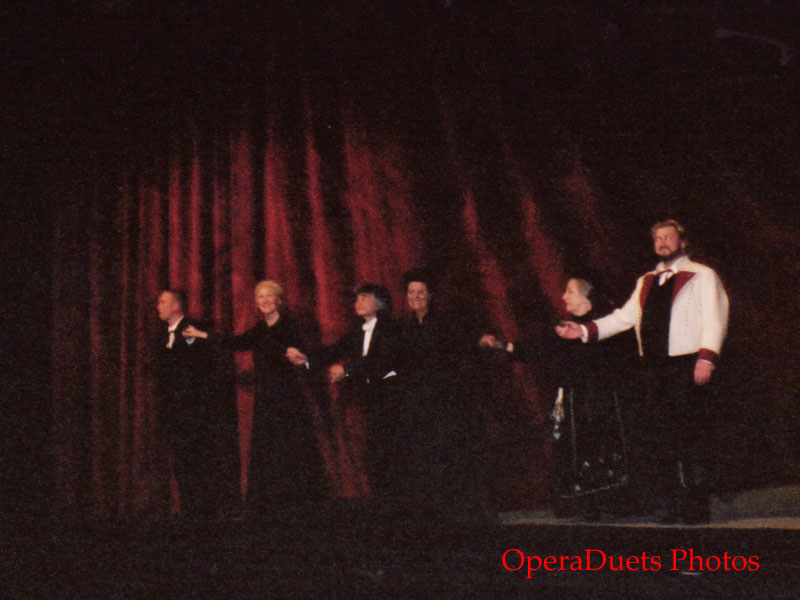
Wiener Staatsoper
sonntag, 9. juni 2002
9. Aufführung in dieser Inszenierung
Koproduktion mit der Janácek Oper Brno
Jenufa
Oper aus dem mährischen Bauernleben in drei Akten
Text von Gabriela Preissová
in der deutschen Übersetzung von Max Brod
Musik von Leos Janácek
Dirigent / Seiji Ozawa
Inszenierung / David Pountney
Bühnenbild / Robert Israel
Kostüme / Marie-Jeanne Lecca
licht / Mimi Jordan Sherin
Choreinstudierung / Ernst Dunshirn
Choreographie / Renato Zanella
...
Orchester, Chor und Balletteleven der Wiener Staatsoper
Bühnenorchester der Wiener Staatsoper
JANACEK: JENUFA, WIENER STAATSOPER 9.6.2002
3 acts with ca. 45 minutes each and a pause after each act. The original is in Czech, but here it was sung in German. It is never easy to hear what the singers sing, especially not in the high notes, and Jánácek´s music is so closely linked to the Czech language, that sung in another language it becomes another ball game. The subtitling system is in place, but it is not always easy to get all the action, something it gets like either read the text or follow the action onstage. The reason I wanted to see Jenufa was Agnes Baltsa as Kostelnicka. Last time I saw it, or first time, was March 2, 2002, and the second time one sees an opera, one understands more, and can enjoy it more.
This time I didn´t use the subtitle in act 1 + 2, but in the 3rd
act I had to give in in order to get all the drama. This time I enjoyed
the music more, since I had listened to it before, or maybe it was better this time. This was after all the 9th performance of this production. Having a head-ache is not the best thing for enjoying an opera performance.I hadn´t had time to eat properly before going to the opera, so the first pause was used to get some nourishment ín me, for a steep prize, naturally. The acting and singing was superb. And I understood now why Agnes Baltsa canceled her Italiana in Algeri on June 12 & 15 in Zürich, the distance between Kostelnicka and her pain, to the rather frivolous Isabella in Italiana in Algeri is just too much in such a short time.
This time, Jánácek's JENUFA
reminded me of the best of Wagner like
Tannhaüser
OD Travel + Photos
Posted by
operaduets
at
Friday, June 09, 2017
0
comments
![]()
Labels: 06_June, 2002, Agnes Baltsa, Angela Denoke, Austria, JENUFA, Jorma Silvasti, LEOS JANACEK, Opera, Torsten Kerl, Vienna
Tuesday, May 9, 2017
May 9, 2011: Jenufa in Vienna
2011-05-09 Jenufa (Jánácek),Wiener Staatsoper
Die alte Buryja = Marta Benachkova
Laca Kiemen = Jorma Silvasti
Stewa Buryja = Marian Talaba
Die Küsterin Buryja = Agnes Baltsa
Jenufa = Angela Denoke
Altgesell = Hans Peter Kammerer
Dorfrichter = Alexandru Moisiuc
Seine Frau = Donna Ellen
Karolka = Caroline Wenborne
Schäferin = Lydia Rathkolb
Barena = Juliette Mars
Jana = Anita Hartig
Tante = Maria Gusenleiter
Graeme Jenkins, conductor
Inszenierung - David Pountney
Bühnenbild - Robert Israel
Kostüme - Marie-Jeanne Lecca
Lichtgestaltung - Mimi Jordan Sherin
Choreographie - Renato Zanella
The conductor Graeme Jenkins looked older, the tenors Marian Talaba and Jorma Silvasti looked fatter, but Agnes Baltsa and Angela Denoke was in great shape and lifted the opera up to the highest level. A debut as Old Burya, Marta Benackova, was greatly applauded in the Staatsoper, but I found her lacking in vocal authority. I saw Angela Denoke as Jenufa in 2002 and I found her good then but she was glorious now. Agnes Baltsa did was must be one of her best Kostelnicka's ever. She was in a fantastic vocal shape and her acting was as sharp as ever. Marian Talaba was Stewa and he did a good figure but I missed the oppulence of a Torsten Kerl in the role. Although Jorma Silvasti did another wonderful Laca performance I think that maybe Talaba should have been Laca Klemen and Silvasti Stewa Burya.
Jenufa is in 3 acts of approx 45 minutes each. Even as the opera ends in a higher and a positive note both act 1 and 2 ends in a tragic shock. Act 3 in the conclusion of a tragedy that was unavoidable but still the positive character of Jenufa gives the opera an end as if we have seen the paradise and the love of God that awaits us there. It is strange that I have seen this opera more times than one and still I was only just now so strongly aware of the religious content. Strange because the opera never hids its Catholic content.
For more reviews from my travels, see www.operaduetstravel.com If you want to see more photos from my OperaDuets Travels, go to www.operaduetsphotos.com
Posted by
operaduets
at
Tuesday, May 09, 2017
0
comments
![]()
Labels: 05_May, 2011, Agnes Baltsa, Angela Denoke, Austria, JENUFA, Jorma Silvasti, LEOS JANACEK, Marian Talaba, Opera, Vienna
Saturday, April 29, 2017
April 29, 2006: Jenufa in Vienna
2006-04-29 Jenufa (Jánácek), Wiener Staatsoper
die alte Buryja = Janina Baechle
Laca Klemen = Jorma Silvasti
Stewa Buryja = John Dickie
Küsterin = Agnes Baltsa
Jenufa = Sinéad Mulhern
Altgesell = Alfred Šramek
Dorfrichter = Johannes Wiedecke
seine Frau = Margareta Hintermeier
Karolka = Bori Keszei
Schäferin = Stella Grigorian
Barena = Cornelia Salje
Jana = Olesya Golovneva
Tante = Maria Gusenleitner
Graeme Jenkins, conductor
29. April 2006
JENUFA
(18. Aufführung in dieser Inszenierung)
Dirigent: Graeme Jenkins
Inszenierung: David Pountney
Bühnenbild: Robert Israel
Kostüme: Marie-Jeanne Lecca
Licht: Mimi Jordan Sherin
Choreinstudierung: Ernst Dunshirn
Choreographie: Renato Zanella
(* Rollendebüt an der Wiener Staatsoper)
Beginn: 19.30
die alte Buryja: Janina Baechle*
Stewa Buryja: John Dickie*
Jenufa: Sinéad Mulhern*
Dorfrichter: Johannes Wiedecke*
Karolka: Bori Keszei*
Jana: Olesya Golovneva*
No cancellation nor sickness from Die Baltsa, but another Jenufa than Ricarda Merbeth the Irish soprano Sinéad Mulhern was singing. So it was not only her role debut in Vienna but her first time in Wiener Staatsoper. Not her first time singing Jenufa, naturally.
What a debut it was!! The Vienna audience loved her Jenufa. A wonderful voice and excellent actress. For me it was confusing in the beginning a new Alte Buryja (Janina Baechle) and John Dickie as Stewa Buryja. Torsten Kerl and Angela Denoke was singing Stewa and Jenufa last time I saw JENUFA. Both very blond and Torsten Kerl is a big man. JOHN DICKIE and SINEAD MULHERN were much darker. So in the beginning I did not even recognize the main players. Jorma Silvasti was singing Laca as before but he seemed to be bigger and more threatening this time. Janina Baechle was a more sympatic widow Buryja. This was the first JENUFA in this season.
I waited at the stage door to see Agnes Baltsa but I had also a train to catch. So I went home earlier than I would normally do.
OD Travel + Photos
Posted by
operaduets
at
Saturday, April 29, 2017
0
comments
![]()
Labels: 04_April, 2006, Agnes Baltsa, Austria, JENUFA, John Dickie, Jorma Silvasti, LEOS JANACEK, Opera, Sinead Mulhern, Vienna
Tuesday, April 4, 2017
April 4, 2009: Jenufa in Vienna
2009-04-04 Jenufa (Jánácek), Wiener Staatsoper
die alte Buryja = Janina Baechle
Laca Klemen = Jorma Silvasti
Stewa Buryja = Marian Talaba
Küsterin = Agnes Baltsa
Jenufa = Ricarda Merbeth
Altgesell = Marcus Pelz
Dorfrichter = Alexandru Moisiuc
seine Frau = Waltraud Winsauer
Karolka = Caroline Wenborne
Schäferin = Roxana Constantinescu
Barena = Juliette Mars
Jana = Ileana Tonca
Tante =
Graeme Jenkins, conductor
Her stepdaughter: Ricarda Merbeth as Jenufa
Agnes Baltsa as Die Küsterin, Jenufa's stepmother.
Wonderful, wonderful!! I like Ricarda Merbeth as Jenufa, Marian Talaba was Ok as Stewa, Jorma Silvasti WAS Laca Klemen, Agnes Baltsa was sensational as Die Küsterin Buryja.
Agnes BALTSA even came out backstage and greeted her fans, and I got to talk to her.
The production is from 2002. Agnes Baltsa was also then Die Küsterin and Jorma Silvasti was Laca Klemen. That time Angela Denoke and Torsten Kerl were Jenufa and Stewa. Both singers have blond hair. Ricarda Merbeth and Marian Talaba have darker hair. Why mention this? Well, not only is Marian Talaba underwhelming as Stewa Buryja but his dark hair undermines the mention in the text about Stewa's supposedly golden hair. Another thing is that all the other people except Küsterin and Laca have dark hair so how do one as audience understand who to look at. Lucky me, having seen this production before I knew where Jenufa would be. Others would not have a clue. And STEWA the big man in this village he looked just like anyone else. With Torsten Kerl, big and blond, he would always catch your eyes. And the maybe Torsten Kerl even has charisma that in my view was lacking from Marian Talaba. Talaba as Stewa was just a plumb, dark-haired man. With Stewa and Jenufa as both blonde-haired and fairer than all the rest, not only would the story be even more believable but also easier to follow.
Other than the lack of right color of the hair of the protagonists there was the orchestra that played wonderfully under conductor Graeme Jenkins but often too LOUD. I was in parkette. Did it sound better in other parts of the opera house? I don't know. But I know that there was exquisite singing drowned by the orchestra. Not all the time but still.. I think this was the best performance of Agnes Baltsa as Die Küsterin. I adored Ricarda Merbeth as Jenufa. Where Angela Denoke had been harder to swallow was Ricarda Merbeth pure vocal joy and wonderful acted too. Jorma Silvasti was Laca Klemen and he could dominate the scene, a man with brute force and with a Vulnerable soul was his Laca Klemen, the sound of his voice was wonderful to listen to, so delicate and pure and still strong, Janina Baechle who was like in 2006 Grandma Buryja was even better acting and sounding than in 2006. Marian Talaba was, unfortunately, a bland Stewa. He has the voice, but something else was missing. He was not helped by having become somewhat heavier in body. But Jorma Silvasti (Laca Klemen) is also a heavy-built man, but he has charisma and an instant-recognizable voice. But Marian Talaba is young, he might still become a wonderful Stewa... AGNES BALTSA was Wonderful as Die Küsterin. What an actress!! To see Agnes Baltsa as die Küsterin to be the strong and strict stepmother of Jenufa and then to see her being so totally broken by the heinous act of her murdering Jenufa's child with Stewa was great theatre. Her singing and acting was marvelous. But the orchestra played wonderful music often too LOUD.
I LOVED this JENUFA!!!!
04. April 2009
Beginn: 19.30 Uhr
Spieldauer: 3 Stunden , Pausen: 2
Premiere am
24. Februar 2002,
Wiener Staatsoper
OD Travel + Photos
Original blog post: Her stepdaughter: Ricarda Merbeth as Jenufa 4.4.2009
For more reviews from my travels, see www.operaduetstravel.com
If you want to see more photos from my OperaDuets Travels, go to www.operaduetsphotos.com
Posted by
operaduets
at
Tuesday, April 04, 2017
0
comments
![]()
Labels: 04_April, 2009, Agnes Baltsa, Austria, JENUFA, Jorma Silvasti, LEOS JANACEK, Marian Talaba, Opera, Ricarda Merbeth, Vienna
